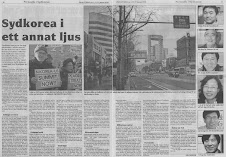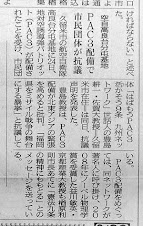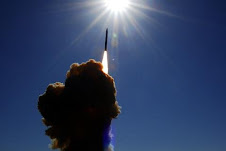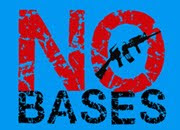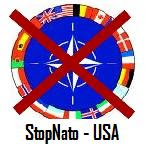Monday, November 30, 2009
Text Fwd: S. Korea to Deploy Airburst Rifle to Afghanistan
Korea Times
S. Korea to Deploy Airburst Rifle to Afghanistan
By Jung Sung-ki, Staff Reporter
Nov. 30, 2009
South Korean troops to be deployed in Afghanistan will be armed with the latest K-11 airburst assault rifles for self-defense, according to the Ministry of National Defense.
The ministry unveiled the timeline as well as the troop numbers and equipment to be sent to the Central Asian nation, last week.
About 350 soldiers will be dispatched to Afghanistan with the main mission of protecting 120 South Korean civilian reconstruction workers, Defense Minister Kim Tae-young said in a National Assembly session. Two dozen civilian reconstruction workers have already been sent to the war-torn country.
A motion calling for the deployment is to be submitted to the Assembly this month, he said.
Besides the K-11 rifle, Korean troops will be supported by four UH-60 transport helicopters, which will be able to avoid potential terrorist attacks using improvised explosive devices (IEDs), ministry officials said. The ministry is also considering sending an RQ-101 unmanned aerial vehicle, they said.
Other key equipment for the Afghan deployment includes Barracuda 4x4 armored wheeled vehicles, K1A/K2 assault rifles and K200 amphibious armored personnel carriers.
Developed by the state-funded Agency for Defense Development, the K-11 consists of a semi-automatic 20mm smart grenade launcher, an under-slung assault rifle firing a standard 5.56mm NATO round, and a top-mounted computer-assisted sighting system with integrated rangefinder and thermal infrared night vision capabilities.
Using a self-detonation system, the 20mm round from the rifle can track its target and explode three to four meters above it. And it is also capable of penetrating walls of buildings.
The Barracuda, built by Doosan DST, is a tactical armored vehicle whose steel plate armor provides ballistic protection against 7.62mm caliber projectiles.
The vehicle can transport 12 men at a top speed of 100 kilometer per hour and climb steep slopes. It is equipped with a roof-mounted small-caliber weapon station, CCTV and a dozer system.
The UH-60 Black Hawk is a four-bladed, twin-engine, medium-lift utility helicopter manufactured by Sikorsky Aircraft. It is armed with 7.62mm machine guns and has a top speed of 296 kilometers per hour.
gallantjung@koreatimes.co.kr
Text Fwd: [Column] Understanding Kim Jong-il’s policy formula
Hankyoreh
[Column] Understanding Kim Jong-il’s policy formula
Lee Jong-seok, former Minister of Unification
Nov. 30, 2009
Former Unification Minister Jeong Se-hyun has used a mathematical analogy to describe what is happening when North Korea behaves in provocative ways that go against South Korea’s expectations. Minister Jeong suggests we are using the decimal system while North Korea is not. Jeong is attempting to get us to realize that if we are to understand North Korea’s strategy, we must first comprehend its understanding of the situation and the diplomatic formula it is choosing to apply.
From the perspective of western nations, North Korea’s long-range missile launches and nuclear tests are clear provocations. Thus, the North Korea reflected in the eyes of western nations is an irrational and deceitful “rogue state,” which, in pursuing nuclear development, has consistently either failed to carry out its agreed-upon promises or else unilaterally abrogated them. North Korea’s constant use of coarse and threatening language has reinforced this western understanding.
What, however, can be said of the West? It tends to believe that its actions are always good since it has no intention of attacking North Korea and is prepared to guarantee the security of the North Korean system and provide economic aid on the condition that it gives up its nuclear program. However, the West has been inconsistent, including the time when the U.S. turned back progress that had been made on the North Korean nuclear issue with the September 19 Joint Statement, invalidating it by applying severe financial sanctions on North Korea for “suspicions of counterfeiting U.S. dollars” without the presentation of any clear evidence.
Japan, has also been inconsistent citing the “issue of abductions of Japanese citizens” as the primary reason for going back on its promise that after the agreement on second-stage North Korean disablement it would give North Korea 200,000 tons of fuel oil. Such actions have provided North Korea with a justification for its provocations, and habituate it to dealing with the West on a different mathematical basis.
In an English-language commentary, Yang Sung-chul, former South Korean ambassador to the U.S., once commented on the confusion Kim Jong-il has likely felt as he has witnessed severe transformations in North Korea policy taking place between successive U.S. administrations. Over the past two decades, Kim has been the supreme policymaker in North Korea. Every time there has been a change in administrations in the U.S., he has seen the abandonment of promises made with North Korea and near 180-degree turnarounds in North Korea policy. The DPRK-US Joint Communique of 2000 promise to improve relations with North Korea was immediately repudiated once the Bush administration took office in 2001, and North Korea found itself placed by the Bush administration together with Iraq and Iran in the “Axis of Evil” that referred essentially to targets of annihilation. Now, with the Obama administration in office, the U.S. is moving towards a policy of engagement once again.
The same can be said of South Korea’s policy toward North Korea. Immediately after signing the 1991 South-North Basic Agreement with the Roh Tae-woo administration, Kim Jong-il was forced to deal with the antagonistic North Korea policy of the Kim Young-sam administration. Afterwards, he was met with the policies of two presidents, Kim Dae-jung and Roh Moo-hyun, who sought reconciliation, cooperation, peace and prosperity. In response to these changes, Kim Jong-il also showed interested in building new inter-Korean relations, and even presented a summit agreement. However, the Lee Myung-bak administration’s Vision 3000: Denuclearization and Openness effectively repudiated this agreement.
While the West has raged over Kim Jong-il’s foul play over the past two decades, he has essentially been taking in the dizzying view of a North Korea policy rollercoaster in the U.S. and South Korean administrations. He most likely has wondered exactly what beat he was supposed to be dancing to. Perhaps to him, South Korea and the U.S. appear utterly impossible to predict. As a result, it appears that Kim may have become every bit as distrustful of South Korean and U.S. leaders as they were of him, and that distrust has had a major influence on the formation of his own diplomatic arithmetic.
Stephen Bosworth, U.S. special representative for North Korea Policy, will soon be visiting Pyongyang. He is charged with the huge mission of drawing North Korea back into the six-party talks and with making headway in realizing peace on the Korean Peninsula. I would like to offer some advice for Bosworth and the policy officials of the Obama administration as they meet this momentous occasion. I hope that they will carry out negotiations with North Korea using a new U.S. arithmetic that takes into account Kim Jong-il’s own perspective and diplomatic arithmetic rather than simply the perspective of the U.S. This will provide a practical foundation for a peaceful resolution on the North Korea nuclear issue.
The views presented in this column are the writer’s own, and do not necessarily reflect those of The Hankyoreh.
Text Fwd: N. Korea criticizes maritime blockade at U.N. meeting
N. Korea criticizes maritime blockade at U.N. meeting
By Kim Hyun
SEOUL, Nov. 30 (Yonhap) -- North Korea argued in a recent U.N. agency meeting that maritime blockades by "certain" countries are threatening the freedom of navigation, the North's media said Monday, in what appeared to be criticism targeting the U.S.
North Korea had sent a delegation, led by Ko Nung-du, to the 26th general assembly of the International Maritime Organization held in London on Friday.
Text Fwd: An Historical Event that Ringed an Warning Bell
Tongil news ( *meaning Unification News)
FOCUS: What is the meaning of an application for the trial to test
the unconstitutionality of the Protection of Communication Secrets Act
and how will be the trials in the future?”
Nov. 29, 2009
Koh, Sung-Jin (kolong81@tongilnews.com)
The Seoul Central District Court totally embraced the appeal for the request of the trial on the issue of the unconstitutionality of the Protection of Communication Secrets Act, submitted by the Pan-Korean Alliance of Reunification (PKAR), South Korea branch on Nov. 27.
In the sense that it was raising the issue on the potentials of the unconstitutionality of the existing investigation custom by the inspection institutions, related to the case charged of the National Security Law, its significance is big and its influence in the trials in the future seem to be large.
The No. 25, Criminal Department of the Seoul Central District Court (Yoon Kyung, Chair judge of the department) saying, “ The clause of the act, applied to this case brings up the great suspicion that it violates the Constitution by overridingly infringes the freedom of the secret in communication and of privacy, committing against the principal of the prohibition of the excessiveness [of eavesdropping], elucidated in the clause NO. 2, article NO. 37 of the Constitution.” permitted the bail out of Lee Kyu-Jae, Lee Kyeong-Won and Choi Eun-A, the accused arrested, accepting the application for the appeal of the trial on the issue of the unconstitutionality of the Protection of Communication Secrets Act, submitted by the lawyers [on behalf of the PKAR] on last Nov. 3.
The court judged like above, in its decision statement, because in the [current] Protection of Communication Secrets Act: 1. The applied areas of the crimes targeted, under the measure for the limitation of communication, are too many, with more than 100: 2. The measure for the limitation of communication, despite the principal that it should be practiced within the limitation measured by the prosecutors [only] in the limitedly defined period, had been allowed to police etc. for a long time without limitation, being overly excessive, compared to the law clause examples of the Acts in the foreign countries: 3. The procedure for the permission for the [eavesdropping] in the extended period is [too] simple. For example, it did not require the [listing of] additional reasons, different from the case of the re-application [for eavesdropping on the targeted], thus had the potentials to infringe the essential parts for the freedom in privacy and communication, [expressed] in the Constitution.
Acceptance of the application for the Constitutional Court Hearing to Test the Constitutionality, in the National Security Law Case, is the Unprecedented:
Various Fields Welcome It As the “Historical Event” That Ringed the Warning Bell against the Law-Evasive Investigation(s).
It is for the first time that the application for the Constitutional Court hearing to test the constitutionality, related to Protection of Communication Secrets Act, was accepted. While it is a rare case to apply for the Constitutional Court hearing to test the constitutionality [of an act], in the trial of the National Security Law, it is very unusual that the department of judges embrace it, stopping the trial and releasing the accused in bail out.
Kwon Oh-Hun, the Honorary Chairman of the Sponsoring Committee for the Political Prisoners, who has watched the trials brought under the National Security Law for decades, saying, “It was for the first time in my life to see the application for the Constitutional Court hearing to test the constitutionality [of an act] in a National Security Law case was ever accepted and the restrained were released” told that “ [It is] a very epochal-making event, a historical [event].”
Chairman Kwon, following that, saying “It was braking the investigation against the self-reliance unification movement”, evaluated it “would bring into the tremendous influence not only in the National Security Law case but also in all security cases.”
Attorney, Chang Kyeong-Wook, one of the members of the attorney panel [on behalf of the PKAR], saying “ The decision of the court this time says that the investigation institutes should not monitor but collect information of [the targeted]”, did not hide his surprise, saying it was “an historical event that ringed the warning bell against the anti-human right & law-evasion behaviors [by the investigative institutes].”
Secretary Lee Kyeong Won Questioned on the Unlimited Eavesdropping by the National Intelligence Service:
It Would Be Likely That the Voice for the Measure for Limitation in the National Assembly Reform of the Protection of Communication Secrets Act, Would Be Heightened.
The application for the Constitutional Court hearing of Protection of Communication Secrets Act first began with the question by Mr. Lee Kyeong-Won, the Secretary of the PKAR, [who had been arrested] and had been eavesdropped in full spectrum of phone, fax, internet line for six years, by the National Intelligence Service (NIS) etc.
Secretary Lee, saying that he “ had known that the wiretapping of phone & fax had been done against the former Secretary, but became to finally confirm it during the trial process”, told he “became to think it was the severe violation of human rights, asked people to send the documents & reference materials, related to Protection of Communication Secrets Act, and perused them in the detention center.”
Attorney Cho Young-Sun, after the Court decision on Nov. 27, saying that, “It was the part that has largely been unconcerned by the attorney panel itself because of its long time inertia”, told himself was, “frankly not so sure whether the part would be accepted [by the court] even in the beginning when Secretary Lee raised the issue”.
The civil social organizations have poured the concern about the hidden eavesdropping by the investigative institutes such as the NIS but could neither raise the legal issue nor counter against it. It is because, even though the investigative institutes have the duty to inform the eavesdropped of the fact of eavesdropping, if they do not inform, there is no way to confirm the fact of eavesdropping.
In fact, it is in most cases, as in the cases of the Practice Solidarity of the South Korea-North Korea Joint Statement and the PKAR, that the accused are informed of the fact of eavesdropping, from the judges, during the process of trials.
In such situation, the legal response against the excessive eavesdropping by the investigative institutes would mostly be little concerned with, during the arguments on the major charges in trials.
However, in this case, the illegal investigative custom by the NIS that had extended the period of eavesdropping [on the accused] for 14times, 2months each, was braked to stop. It is the judgment of the Court that it was the eavesdropping not for the collection of the proofs but for the routine monitoring.
As of that matter, it would be likely that there would be the heightened voice that demands the fundamental measures that could limit the ways of the unlimited eavesdropping by the investigative institutes, in the [discussion] of the reform of the Protection of Communication Secrets Act, being processed by the National Assembly.
The Trials Will Be Stopped For the Unlimited Period Until the Decision of the Constitutional Hearing…”Perhaps More Than A Year”:
The Decision on the Unconstitutionality of the Act on the Prohibition of Night Rally, Last Year, Has Taken 11 Months, As Well.
The [Constitutional] Court hearing for the test of the unconstitutionality of an Act happens if a court makes a decision for the test of the (un)constitutionality, either by the application by the applicant or by the direct right of the court. If the official document form on the decision for the test of (un)constitutionality in the Constitutional Court hearing is sent to the Constitutional Court, through the Supreme Court, the Constitutional Court registers it and processes the procedures of the trial on it.
When the court applies for a trial for the constitutionality test of an act, the trial of the very case [connected to an act] is stopped, until the decision of the (un)constitutionality by the Constitutional Court is made. Even though the time to final decision is not defined, it is usually guessed for near a year to be taken so the trial on the PKAR [accused] would be stopped without defined time.
In October, last year, the decision of the unconstitutionality on the application, for the test of (un)constitutionality of the article No. 10 and clause No. 1 in article 23, in the Act on the Rally that prohibited the outside rally in the night, only came out in late this September, after 11 months have passed.
Attorney Cho Young Sun said, “ [I am] not so sure when the trial would open. [I think] we need to wait for at least more than a year. Even though it might take rather sooner because the issue is simple, I am expecting that it would be about a year”.
The Court said, “ Depending on the Issue of (Un)constitutionality, the issue of adoption of the [collected] Proofs and the Decision of Guilty or No Guilty could differ”.
Generally, the application for the test of constitutionality of an act is limited only when the issue of the (un)constitutionality of the targeted clauses in an act becomes the premise for the trial on the related case. In other words, it means, the issue of the (un)constitutionality of the measure for the limited communication, could seriously affect the result of the PKAR trial.
The court saying that “ The proof materials collected on the basis of the clauses of the Act, such as on the measure for the limitation of communication, look as the important proofs of the activities, traces and propositions of the accused at the time and of the content that supports the described [lists] in the accusation charges, such as the content of the meeting with the North Korean agent, in this case”, announced that “The basing Act with the measure for the limitation of communication, which was applied with extension period [of eavesdropping against the accused], could lose its effectiveness, depending on the issue of the unconstitutionality… Since that could affect the court decision whether the court would take the materials as proofs or not, and as a result of it, the decision of guilty or no guilty [of the accused] could differ in this case, as well. Therefore the issue of the unconstitutionality of the clauses of the Act becomes the premise of the trial of this case.”
In other words, while the prosecutors’ main accusation charges in the PKAR trial are ‘ infiltration & escape’ and ‘ meeting & communication [with enemy]’, the court sees that the collected proof material, according to the extended measure for the limitation of communication, could influence to prove the charge against them.
It is because, if the measure for the limitation of communication is decided as unconstitutional in the Constitutional Court, the materials collected according to the measure lose its effectiveness and can not be adapted as the proofs.
Cho Young Sun, “ If the Decision of the Unconstitutionality Is Made, the Aspects of the Trial Would Be Largely Differentiated.”
Lee Kyeong Won Has “a Thought That the Decision of the Unconstitutionality Will Not Largely Affect for the Prosecutors to Prove the Main Charges” and Says, He Would “ Focus on Proving the Legal Activities of the PKAR.”
Regarding [the judge’s remarks], it will be like that the future of the PKAR trial will be largely differentiated [depending on the decision]. The decision of the unconstitutionality would work not as a small factor in the trial.
Attorney Cho saying that, “If the decision of unconstitutionality is made, the proof materials for the main charges become nullified and following it, the aspect of the trial could be largely differentiated” expressed his expectation that that he could even prospect of [the court decision of] no-guilty [of the PKAR accused] in the best case.”
Kwon Oh-Hun, Honorary Chairman, saying that “ If there is the decision of unconstitutionality, the prosecutors may find the ways to re-compose of the accused charges”, predicted that “ The focus of the trial might be on the part of the issue of the enemy-benefiting propensity of the PKAR.”
Secretary, Lee Kyeong-Won, saying he would concentrate on informing the rightness of the PKAR activities, beyond the issue of the (un)constitutionality of the measure for the limitation of communication, looked not to put the big meaning on the decision of the (un)constitutionality, despite aligning his opinion on prospect same with that of Kwon, Honorary Chairman,
Secretary Lee, saying “The issue of the unconstitutionality of the Protection of Communication Secrets Act, could not so be so much applied to the trial. It seems it will be only a part”, predicted that “ Even though the effectiveness of the proof materials may be nullified, it would not greatly affect the decision of the trial.”
Saying, “The prosecutors seem to think there is no problem to prove the main charges, even if the measure comes out as unconconstitutional in the [Constitutional Court decision] , because [their] proof material for the charges of ‘meeting & communication [with the enemy] is such as the Joint statement between the South and North Korea, which is openly informed in the homepage site” and “ Also because the proof materials related to ‘infiltration & escape’ “ that are in the accusation documents” were acquired by the confiscation & search of the emails, it looks it is their position that the issue of unconstitutionality is not a matter.”
Following that, [reputedly] saying, “If all the talks heard from the North Koreans are considered as the order-receiving, [according to the logic of their] charge of ‘meeting & communication [with the enemy]”, how the talks by our side can be explained?” told, “ All those appear at the meeting record at the time and [I] would focus on proving the parts that the activities of the PKAR are legal exchange, with the permission by the both authorities of the South and North Korea.”
End-
Sunday, November 29, 2009
Text Fwd: NK Urgers Seoul to Act to Improve Ties
Nov. 28, 2009
NK Urgers Seoul to Act to Improve Ties
It's time for South Korea to take steps to thaw the chilled relations with the North, North Korea said Saturday, claiming it has done all it can.
"We have done everything we were supposed to for the improvement of North-South relations and now it is time for the South Korean government to reciprocate," Uriminzokkiri, the North's official Web site, said, citing Rodong Sinmun, a newspaper published by the ruling Workers' Party.
It claimed the Seoul government has not done even a "little bit" to help improve cross-border ties.
"If the South Korean government is even a bit interested in North-South relations, it will naturally have to show a positive reaction to our fair actions," is said.
* Related Korean article
Tongil News
North Korea press says, “ The Cease Fire Agreement has to be altered to the Peace Agreement”
Nov. 29, 2009
Jeong Myung-Jin(mjjung@tongilnews.com)
北 매체 “정전협정을 평화협정으로 교체해야”
2009년 11월 29일 (일) 11:08:43 정명진 기자
Text Fwd: CentCom planners study massive move of equipment to Afghanistan
CentCom's logistics facing a do-or-die test
Thursday, November 26, 2009
By William R. Levesque, Times Staff Writer
______________________________
TAMPA — With President Barack Obama poised to ramp up troop levels in Afghanistan, U.S. Central Command [CentCom] planners are in the midst of the military's biggest logistical challenge since the Vietnam War.
How do you marshal billions of dollars in equipment to escalate one war in Afghanistan while scaling back another in Iraq?
"This is probably the most complicated logistical operation we've done in our lifetime," said Army Maj. Gen. Kenneth Dowd, director of logistics for CentCom, which is based at Tampa's MacDill Air Force Base.
In a wide-ranging interview with the St. Petersburg Times this week, Dowd said landlocked Afghanistan presents greater difficulties than Iraq with its fewer routes of supply.
CentCom is now conducting an assessment of air strips in Afghanistan, and Dowd said engineers will have to expand them in order to resupply larger numbers of troops by air.
"I'm a little concerned about" airfield capacity, Dowd said. "We've got to expand and make it better."
At the same time, Dowd said, engineers will have to spend considerable time removing mines in the rugged country dating to the Soviet invasion three decades ago.
All of that activity comes as his office determines the fate of 2.8 million pieces of equipment troops have brought to Iraq.
"It's really quite an art," Dowd said of this life-and-death logistical dance.
Obama is expected to announce next week an escalation of the U.S. effort in Afghanistan that will send as many as 30,000 additional troops on top of the 68,000 already there.
Much of the U.S. equipment in Iraq will never return to the states.
Often, it isn't cost-efficient to do so, planners say.
Much of it will be sold to Iraqi security forces, Dowd said. Other gear not sent to Afghanistan after refurbishment in Kuwait might be placed in storage somewhere in CentCom's area of responsibility, which includes 20 nations in the region.
This can be a daunting political challenge in the Middle East, where other nations will not want any U.S. presence in their territories.
Some look back at the U.S. experience in Vietnam as a cautionary tale for Iraq planners.
Rep. Ike Skelton, D-Mo., told reporters earlier this year that he worried about too much gear being left behind, which he said happened in Vietnam.
When he visited Vietnam after the war, "I remember seeing rows and rows of U.S. equipment that we left behind. We must do a better job managing the redeployment from Iraq," he said in a statement in July.
Dowd said his planners have been working for more than a year on a smooth withdrawal from Iraq. He said he expects few major problems.
He said technology helps his office more efficiently move and track gear than ever before.
Dowd acknowledged that planners have to learn from mistakes made in Iraq, particularly in quickly building a military infrastructure providing for tens of thousands of troops.
He noted problems with poorly installed and maintained electrical wiring. Some troops were electrocuted.
"We jumped into some of these buildings over there," Dowd said. "We occupied them. … But you wouldn't want to live in that house because of the way the electrical wiring was done. We spend a lot of time making sure these locations are safe."
To Dowd, the folks working under him who make sure the flow of supplies doesn't stop are some of the unsung heroes of the wars.
"There are young American folks who make this happen," Dowd said. "They don't wear much rank on their lapels. But they're phenomenal."
PO Box 652
Brunswick, ME 04011
(207) 443-9502
globalnet@mindspring.com
www.space4peace.org
http://space4peace.blogspot.
Text Fwd: SPACE JUNK AND SPACE DEBRIS
SPACE JUNK AND SPACE DEBRIS
J. Narayana Rao
As we are facing environmental and ecological problems on earth, similar problems are also cropping up in Space. Within a period of 52 years only ever since the first satellite Sputnik was launched by USSR in 1957 we are encountering with the danger of environmental and ecological problems in Space.Traffic congestions as on earth are also not uncommon in Space. While more and more satellites are launched in Space, the care that has to be taken for these satellites to be in orbit safely is no less important than any vehicles moving on the road on earth. Satellites colliding is also taking place in Space.It may be surprising that how accidents and traffic congestion happen in space .
At present there are 240 Civil & Military Communication Satellites and more than 800 remote sensing reconnaissance Satellites are in Space.We are launching the satellites for using in Telecommunications,weather observations, navingation, reconnaissance and many other benefits for the mankind. Accummulation of Space Junk and Space Debris are the causes of environmental and ecological damage to the space.
ACCUMMULATION OF SPACE JUNK
Space debris also known as orbital debris space junk and space waste. Spent Rocket Parts, defunct and unsed satellites, exploision fragments, paint flakes, slags from solid reocket motors, small needles, nuts and bolts are the basic source of space debris and space junk. When these objects Collide with each other or explode or blasted they get fragmented into small pices. In a mid 2009 appraisal, the NASA estimated that the number of large pices of debris of 10 cms and over at 19,000, between 1 and 10 cms at 500,000 and smaller than 1 cm probably exceed tens of millions. A 1999 study estimated that there are some 4 million pounds of space junk in the low earth orbit. During the last one decade the estimated objects of over 10 cms in the Low Earth Orbit have more than doubled from 8,500 in 1990 to 19,000 in 2009. In 17 March 1958 US launched it’s second satellite the Vanguard I. It functioned only for 6 years and remained in space. It became as one of the longest surviving piece of Space Junk. On 24 July 1996 “Cerise” a French microsatellite in the Earth Low Orbit was hit by fragments of Arian upper booster which exploded in November 1986. On 29 March 2006 the Russian Express AM II Communication satellite was struck by an unknown object which rendered it inoperative.
Rocket Boosters contribute a good number of debris. On 11 March 2000 a Chinese upper stage booster exploded in orbit and created a cloud of debris. On 19 Feb 2007 a Russian Briz. M Booster stage exploded in orbit. On 24 January 78 Cosmos 954 of the USSR, powered by an onboard Nuclear Reactor fell from orbit crashing into the northwest territories of Canada. It scattered nuclear debris over a huge area. At present there are 37 Nuclear powered satellites put in space by USSR and US.The operation of these satellites is over. But the radioactive fuel in them is still hot and lethal.These are likely to fall on earth in future.
TESTING OF ANTI SATELLITE WEAPONS
Another major source of debris is testing Anti Satellite weapons. US, USSR and China contribute to this. The Chinese test of 2007 in which a defunct satellite was blasted produced 2,300 pices of trackable pices of debris of Golf Ball size. Over 35,000 pices of 1 cm or larger and 1 million pices of 1 mm or large size. In 1985 a US test destroyed a 1 tonne Satellite orbiting at 525 km altitude. It created thousandsof pices of debris larger than 1 cm. On 20 February 2008, the US launched a SM-3 missile to destroy a defective US spy satelliteat about 250 km altitude.
MATERIAL LOST IN SPACE.
Gemini 4 Astronaut of US, Edward White who performed the first Space Walk lost a Glove in Space. It stayed in orbit circling with a speed of 28,00 kmph. Michael Collins another Astronaut lost a Camera near the Space Craft Gemini 10.Soviet Cosmonauts pushed out more than 200 garbage bags from the MIR Space Station.Sunita Williams also lost a Camera in Space.
According to a BBC study, a 1 mm metal chip could do as much damage as a 22 caliber rifle bullet.A pea sized ball moving at a speed of 36,000 kmph is as dangerous as 400 lb safe travelling at 60 mph. A metal sphere the size of a tennis ball is as lethal as 25 sticks of dynamite.
PROTECTIVE MEASURES.
Damage to the space crafts from the space debris is protected by applying a thin layer of metal foil outside of the main Space Craft body.When the debris collide with the foil with high velocity,the debris will be vaporized and the plasma spreads out quickly. By this process damage to the inner wall of the Space craft is protected. Space crafts powered by Solar Panels are liable to be affected badly because the front portion of the panels are positioned directly exosed to the Sun.As a result they get punctured by debris. When large pices of space debrice collide with space crafts the damage is much heavy.
COLLISIONS IN SPACE.
The US Olympus space craft was rendered dead after it collided with a meteor. The first major collision with space debris was on 10 February 2009 when a deactivated 950 kg Cosmos and an operational 560 kg Irridium 33 collided at an altitude of 800 km over northern Siberia. Both the satellites were destroyed scattering considerable debris. In 2006 Atalantis Shuttle of US was hit by debris and got small hole through the radiaton panel. In 2007 Endevour was hit by unknown debris which bore a hole of several centimeters in diameter through the panel.
Most debris are likely to bur up in the atmosphere.But larger objects can reach the ground and present a risk. In the 2009 European Air and Space conference at the University of Southampton, UK, Hugh Lewis a researcher predicted that the threat from space debris would rise 50 percent in the coming decade and quadruple in the next 50 years.
With the ongoing programme of weaponisation space by the US in which even Nuclear Reactors are likely to be put in space to create sufficient energy to create Laser Beams the problem of Space Junk and Space Debris will further gets accentuated,
--------
Friday, November 27, 2009
Special: Three PKAR Unification Activists Released Today!
 WHOLEHEARTEDLY WELCOME
WHOLEHEARTEDLY WELCOMETHE THREE RELEASED!!!
For the congratulation messages from Bruce Gagnon,
MacGregor Eddy, and Makiko Sato, see the bottom.
브루스 개그논, 맥그리거 에디, 마키코 사토의 축하 메시지가
사이트 하단에 있읍니다. (국문 번역)
* This site was thankfully translated and featured in Japanese
by Makiko Sato. Click HERE. Thanks very much, Makiko!
 *Image source: Cho Sung-Bong, Tongil News, Nov. 27, 2009
*Image source: Cho Sung-Bong, Tongil News, Nov. 27, 2009' Choi Eun-A(second from the left), Lee Kyu-Jae(middle) and Lee Kyeong-Won(second from the right).
Two lawyers in the both ends corresponded the three.'
 Image source: same as above
Image source: same as above Image source: same as above
Image source: same as above Image source: Kang Jae-Hoon, Hankyoreh, Nov. 28, 2009
Image source: Kang Jae-Hoon, Hankyoreh, Nov. 28, 2009Court Decided the Bail Out for the Three Activists, Including Lee Kyu-Jae (chairman), [Lee Kyeong Won(Secretary/Director) and Choi Eun-A], Pan-Korean Alliance for Reunification (PKAR), South Korean branch:
The Court Positively Reviewing the Lawyers’ File for a Constitutional Court Hearing to Test the Constitutionality of the Protection of Communication Secrets Act…A Welcome Press Interview This Afternoon
The No. 25, Criminal Department of the Seoul Central District Court announced in the morning on Nov. 27 that the Court “accepted the lawyers’ application and sent it to the Constitutional Court because the [Protection of Communication Secrets Act] has the loopholes for the prosecutors to infringe the freedom of individual communication and of privacy during the process of the limitation of communication” and the Court “poses the trial and releases the accused “.
Therefore, the three were released late afternoon and warmly welcomed by their families, PKAR colleagues, activists, and friends in front of the Seoul Detention Center today.
(Summary translation of the article by Koh Sung-Jin, Tongil News, on Nov. 27, 2009)
* Related blogs
http://nobasestorieskorea.blogspot.com/2009/11/text-fwd-historical-event-that-ringed.html
Monday, Nov. 30, 2009
Text Fwd: An Historical Event that Ringed an Warning Bell Against the Law-Evasive Investigation”
FOCUS: What is the meaning of an application for the trial to test the unconstitutionality
of the Protection of Communication Secrets Act and how will be the trials in the future?”
Tongil News, Koh Sung-Jin, on November 29, 2009 (unofficial translation)
http://space4peace.blogspot.com/2009/11/happy-news-from-south-korea.html
Saturday, November 28, 2009
HAPPY NEWS FROM SOUTH KOREA (Choi Eun-A's video included)
http://nobasestorieskorea.blogspot.com/2009/09/text-fwd-update-on-jailed-south-korean.html
Tuesday, September 22, 2009
Text Fwd: UPDATE ON JAILED SOUTH KOREAN REUNIFICATION ACTIVISTS
http://nobasestorieskorea.blogspot.com/2009/09/three-unification-activists-released-on.html
Thursday, September 17, 2009
Three Unification Activists Released on Sept. 10, PKAR News Letter
http://nobasestorieskorea.blogspot.com/2009/05/text-fwd-global-network-letter-to-human.html
Thursday, May 14, 2009
Text Fwd: [Korean translated] Global Network Letter to Human Rights Office, Republic of Korea Consulate-General Office
(Collection of all the blogs on the process from the arrest of the six on May 7 and to the recent movement for the remaining three included in the bottom of the site)
* Afterward: In the welcoming dinner *
About 70 people welcomed the released three in the dinner.
All could not but drink some Korean traditional rice alcohols.
All were proud of the three.
 Choi Eun-A with her parents and brother after the dinner. Choi Eun-A’s parents said
Choi Eun-A with her parents and brother after the dinner. Choi Eun-A’s parents saideven though they were so sorry to see their daughter have chosen such a hard way, they trust her
and feel proud of her. They thanked many people to help to release their daughter.
All went to their home in Daejeon, after the dinner. Eun-A’s mother is so happy to be able to
sleep with her daughter tonight after more than six month suffering.
 Chairman Lee Kyu-Jae and Secretary Lee Kyeong Won’s family also thanked to
Chairman Lee Kyu-Jae and Secretary Lee Kyeong Won’s family also thanked tomany people including the Global Network and friends all over the world.
 Secretary, Lee Kyeong-Won’s wife and their 11year old son Kang. Kang is the hero
Secretary, Lee Kyeong-Won’s wife and their 11year old son Kang. Kang is the herowho wrote the beautiful letter to his father after his arrest.
 Chairman Lee Kyu-Jae encourages his colleagues.
Chairman Lee Kyu-Jae encourages his colleagues. __From Bruce K. Gagnon on Nov. 27, 2009
브루스 K. 개그논으로부터 (2009년 11월 27일)
Dear friends at PKAR:
친애하는 범민련 친구분들
It was with great joy that we learned about the release of the three remaining PKAR activists from jail.
What a great development.
구치소에 있었던 나머지 세 범민련 활동가들께서 석방되었다는 소식에 크게 기뻤읍니다. 얼마나 경사입니까
We can only hope that this means that real justice still might prevail in this case that should never have been taken in the first place.
우리는 이것이 단지 무엇보다 일어났지 말았어야 할 일에서 진정한 정의가 아직도 이길 수 있음을 의미함을 바랄 뿐입니다.
How can the government of 2MB have ever thought for a moment that the work of PKAR was anything more than sincerely trying to bring true peace and reconciliation to the Korean peninsula? Peace can only happen when all US military forces in South Korea have returned to their own homes where they belong.
범민련은 단지 한반도에 평화와 화해를 가져오려 진지하게 노력했을 뿐이었다는 것을 2MB 정부가 순간 생각이나 할 수 있었겠읍니까? 평화는 오직 남한의 모든 미국 군대가 그들이 속한 그들의 고국으로 되돌아 올때만 일어날 수 있읍니다.
Please know that we are still following the PKAR case closely and that we are ready to assist you in anyway that you request.
우리가 범민련 사건을 아직도 가까이 지켜 보고 있으며 여러분들께서 요청하실 때 여러분을 도울 준비가 되어 있다는 것을 알아 주시기 바랍니다.
Best wishes to all there.
그 곳의 모든 분들께 최고의 기원을 올립니다.
Bruce K. Gagnon
브루스 K. 개그논
Coordinator
사무총장/ 코디네이터
Global Network Against Weapons & Nuclear Power in Space
우주의 무기와 핵을 반대하는 글로벌 넷워크
PO Box 652
Brunswick, ME 04011
메인주 브런스윅 우편함 652 (우편함 04011)
(207) 443-9502
globalnet@mindspring.com
www.space4peace.org
http://space4peace.blogspot.com/ (blog)
* Bruce K. Gagnon, as soon as he heard the news, has written the letter to the South Korean consulate and collected the 741 petition signs from 17 countries in three days. He has continuously concerned with the condition of the six arrested PKAR activists, visited Choi Eun-A in the Seoul Detention Center and PKAR office in August. He has also watched the trial of the three in Seoul in October. Please see here.
*브루스 개그논은 소식을 듣자마자 뉴욕 남한 영사관에 편지를 썼고 3일만에 17개국으로부터 741인의 서명을 받았읍니다. 그는 구속된 6인의 범민련 활동가들의 상태에 대해 계속 관심을 가졌으며 8월, 서울 구치소에 있는 최은아님과 범민련 사무실을 방문했읍니다. 그는 또한 10월 서울에서 3명의 재판을 지켜보기도 했읍니다. 여기를 보시길.
__From MacGregor Eddy on Nov. 28, 2009
맥그리거 에디로부터 (2009 년11월 28일)
'Smiles and salute to friends of peace'
'평화의 친구들에게 미소와 인사를'
To our dear friends of peace in Korea,
한국의 친애하는 평화 친구 여러분들께
This chilly winter morning my heart is warmed to see the smiles on your faces and the flowers in your hands. Congratulations on your work for peace. Thanks to all of the people in Korea and around the world who stand for justice. Speaking the truth you cannot be silenced or intimidated. We stand with you even if we are far away.
이 추운 겨울 아침 제 마음은 여러분들 얼굴의 미소와 손에 든 꽃다발을 보고 따뜻해집니다. 평화를 위한 여러분의 일에 축하를 드립니다. 한국과 세계의 정의를 상징하는 모든 분들께 축하드립니다. 진실을 말하는 일에 당신들은 침묵되거나 위협받을 수 없읍니다. 우리는 비록 멀리 떨어져 있어도 당신들과 같이 있읍니다.
Your friend for peace
평화를 위한 당신의 친구
MacGregor Eddy
맥그리거 에디
Women's International League for Peace and Freedom DISARM
평화와 정의를 위한 국제 여성 연맹 비무장 위원회
and the advisory board member, California, United States, of Global Network against Weapons and Nuclear Power in Space
그리고 우주의 무기와 핵을 반대하는 글로벌 넷워크 자문 위원 일원(캘리포니아, 미국)
* MacGregor Eddy, despite her many works and fatigue, has voluntarily delivered the Global Network letter in protest for the arrest of the six PKAR activists to the South Korean consulate in the New York, UN, and Amnesty International on May 12 in the City of New York, as soon as she heard the news. Please see here.
*맥그리거 에디는 많은 일과 피곤에도 불구, 소식을 듣자마자 5월 12일, 뉴욕시에 있는 남한 영사관, 유엔, 앰니스티 인터내셔널에 범민련 활동가 6명 구속을 항의하는 글로벌 넷워크 편지를 자발적으로 전달했읍니다. 여기를 보시길.
__From Makiko Sato on Nov. 28, 2009
마키코 사토로부터 (2009 년11월 28일)
Dear friends who were under arrest for seeking for peaceful reunification,
평화로운 재통일을 위하다 구속되었던 친구들에게
I'm not representing any group in Japan but I just want to tell you that nothing has been so delightful in my recent days as the news of your release.
제가 일본의 어떠한 그룹도 대표하지 않지만, 여러분들의 석방 소식만큼 제 최근의 일상에서 기쁜 일은 없었다고 말하고 싶습니다.
Some people here in Japan did care and got angry as soon as the news spread of your arrest.
여러분들의 구속 소식이 전해지자 마자 일본의 어떤 이들은 염려하고 분노해 했읍니다.
I freshly realized that those who desire for peace in East Asia can join force across border if need be.
저는 동북아의 평화를 원하는 이들은 필요하다면 국경을 뛰어 넘어 같이 힘을 합칠 수 있음을 새롭게 깨달았읍니다.
So, you can regard my personal delight and relief last night as such from those in Japan who
have long wished for peace and prosperity for the sake of all the people on the Korean peninsula.
그러므로 여러분들은 지남 밤 일본에서 한반도 모든 이들의 평화와 번영을 오랫동안 바랬던 많은 이들처럼 제 개인적인 기쁨과 안도를 간주하실 수 있읍니다.
I wish you good health and hope your dignity will be fully recovered soon.
저는 여러분들의 건강과 함께 여러분들의 존엄이 곧 회복될 수 있기를 기원합니다.
Makiko Sato,
마키코 사토,
An advisory board member, Japan, of Global Network against Weapons and Nuclear Power in Space
우주의 무기와 핵을 반대하는 글로벌 넷워크 자문 위원 일인(일본)
*Makiko Sato was the pivotal help to spread the news of the six PKAR activists and to collect the enormous signs to the international petition lead by the Global Network in Japan. She also translated many Korean news, specially on the arrested PKAR activists and informed to the Japanese friends. Please see here and here.
*마키코 사토는 구속된 범민련 6명 활동가들의 소식을 일본에 전하고 글로벌 넷워크에 의해 주도되는 국제 서명에서 많은 일본 친구들의 서명을 받을 수 있게 결정적인 도움을 준 이입니다. 그는 또한 특히 구속된 범민련 활동가들에대한 소식을 비롯, 많은 한국의 뉴스를 번역하고 일본 친구들에게 알렸읍니다. 여기와 여기를 보시길.
Text Fwd: Military to Submit Motion Next Month to Dispatch 350 Troops to Afghanistan
1-27-2009 17:26
Military to Submit Motion Next Month to Dispatch 350 Troops to Afghanistan
By Kim Sue-young, Staff Reporter
The Ministry of National Defense will submit a motion to the National Assembly next month on sending troops to Afghanistan and dispatch a survey team after the submission, according to a government source Friday.
The government is mulling over dispatching a 120-member provincial reconstruction team (PRT) and 350 troops to protect the aid workers, he added.
``The ministry plans to submit the motion and send the team for a detailed inspection,'' he said on condition of anonymity. ``They will determine on the dispatch site after the inspection and coordination with NATO.''
Seoul made public a plan late last month to expand its provincial reconstruction team (PRT) and provide troops to protect aid workers in the war-torn country.
A preliminary research group led by Deputy Foreign Minister Lee Yong-joon inspected Parwan Province near the Afghan capital Kabul, which is considered the most suitable area to base civilian workers.
The number of aid workers and security forces, and the scope of their activities have yet to be determined but Defense Minister Kim Tae-young said that the number of troops would be more than 300.
``We are considering sending more than 300 troops to protect the civilians and cope with possible threats (from hostile forces),'' he said in a meeting of an Assembly subcommittee on national defense.
The remarks came after the chief of U.S. intelligence made a three-day unpublicized trip to South Korea from Sunday.
Dennis Blair, director of National Intelligence, met with Foreign Minister Yu Myung-hwan, Defense Minister Kim and National Intelligence Service chief Won Sei-hoon to discuss Seoul's troop dispatch trip to Afghanistan, and the North Korean nuclear issue, according to reports.
After his visit, the government held a policy coordination meeting and is mulling over sending more troops than originally planned, another government source said.
Blair, a retired Navy four-star admiral, is responsible for overseeing 16 intelligence organizations in the United States including the Central Intelligence Agency (CIA).
He is also said to have met President Lee Myung-bak but Cheong Wa Dae refused to confirm the report.
South Korea withdrew its troops, medics and engineers from Afghanistan in 2007 after 23 missionaries were kidnapped by the Taliban.
Two of the hostages were killed before the remaining 21 were released under the condition that Seoul would remove its forces from the country.
ksy@koreatimes.co.kr
* Related article
StopNATO
350 South Korean Troops Offered To NATO For Afghanistan
UPI, Nov. 27, 2009
* Related blog
http://nobasestorieskorea.blogspot.com/2009/11/text-fwd-us-intelligence-chief-visited.html
Thursday, November 26, 2009
Text Fwd: U.S. intelligence chief visited S. Korea for Afghan deployment, nuke consultation
Text Fwd: New Armored Vehicles Put Into Service
Korea Times
11-27-2009 19:40
New Armored Vehicles Put Into Service
By Jung Sung-ki, Staff Reporter
The K21 Infantry Fighting Vehicle (IFV) will be operational with the Army later this month, Doosan DST, the developer of the new armored vehicle said Friday.
The vehicle, jointly developed by the state-funded Agency for Defense Development, will serve as a core part of the Army's future mechanized divisions.
The K21 features better performances than the M2A3 of the U.S. Army and the Russian BMP-3 in firepower, mobility and survivability, the company said.
The 25-ton IFV has a 750-horsepower turbo-diesel engine and 40mm auto cannon capable of shooting down slow-moving helicopters and aircraft. It can engage in C4I warfare using digital communication, GPS receivers and inter-vehicle digital links, it said.
The vehicle can travel as fast as 70 kilometers per hour on paved roads and cross a river at a speed of 7.8 kilometers per hour with the help of the Water Jet propulsion system, according to the release.
"We're proud that the K21 built with on our own technology will begin service with the Korean military," Eom Hang-seok, a representative of Doosan DST, said in a cermeony to mark the mass production of the K21 in Changwon, South Gyeongsang Province.
He also expected the vehicle to become one of the high-flying IFVs on the global market, given the K21's high performances and price competitiveness.
A fully-equipped K21 cost about 4 billion won ($3.4 million) — cheaper than the U.S.-built Bradely and Germany's Puma IFV, whose per-unit prices are estimated between $4 million and $4.5 million.
Doosan will produce a total of 166 units under the first phase contract. Under the Defense Reform 2020 initative, the Army plans to acquire a total of 466 K21 vehicles.
gallantjung@koreatimes.co.kr
Photo Fwd: Unionized rail workers go on indefinite strike
'Unionized rail workers go on indefinite strike'
Nov. 26, SEOUL, South Korea -- Unionized rail workers shout slogans during a rally at the plaza of Seoul Railroad Station on Nov. 26. The railway union began an indefinite strike early in the day after negotiations with the management over financial belt-tightening and working conditions fell through. (Yonhap)'
Text Fwd: U.S. intelligence chief visited S. Korea for Afghan deployment, nuke consultation
* Please refer to '2+2 meeting' in the label. The 2 means foreign and defense ministers. The current NIS chief, Won Sei-Hoon was the very person who arrested the six PKAR activists under the charge of the National Security Law. His NIS has been severely criticized for its dramatic expansion of civilian wiretapping that is illegal.
Yonhap News
2009/11/27 07:24 KST
U.S. intelligence chief visited S. Korea for Afghan deployment, nuke consultation
SEOUL, Nov. 27 (Yonhap) -- The head of U.S. intelligence visited South Korea earlier in the week to discuss Seoul's Afghan troop deployment plans and North Korea's nuclear standoff, a government source said Friday.
The source, who declined to be identified said Director of National Intelligence Dennis Blair was in the country from Sunday through Tuesday and met with senior South Korean officials including Foreign Minister Yu Myung-hwan and Defense Minister Kim Tae-young.
He also met with National Intelligence Service chief Won Sei-hoon.
The official said that Blair explained recent moves by Washington to increase troop levels in the country, and listened to the South Korean deployment timetable.
Blair is responsible for overseeing 16 intelligence organizations in the United States such as the Central Intelligence Agency.
yonngong@yna.co.kr
Text Fwd: 65 Percent Progress Made in Wartime Command Transfer
Korea Times
11-26-2009 21:41
65 Percent Progress Made in Wartime Command Transfer
By Jung Sung-ki
Staff Reporter
South Korea has taken over about 65 percent of elements from the U.S. military for the independent operational control of its forces during wartime, the Joint Chiefs of Staff (JCS) said Thursday.
JCS officials made public the progress during a meeting with retired military chiefs at JCS headquarters in Seoul. About 70 former generals led by Paik Sun-yup, former JCS chairman, attended the meeting, the officials said.
A JCS official said the two independent theaters commands for South Korea and the United States would be able to begin initial operations in 2011 before the official transition of wartime command in April 2012.
``Except for the C4I digital command-control system involving many technical issues for the transition, other elements have been transferred from the U.S. to the Republic of Korea as scheduled,'' the official said, asking not to be named.
Seoul and Washington agreed in 2007 that Korean commanders would execute independent operational control of their troops during wartime, with the U.S. military shifting to an air- and naval-centric supporting role.
The two governments plan to set up their own theater commands after disbanding the ROK-U.S. Combined Forces Command (CFC).
South Korea voluntarily handed over both peacetime and wartime operational controls to the U.S.-led United Nations Command at the outbreak of the 1950-53 Korean War. The command authority was later transferred to the CFC. Korea took over peacetime control in 1994.
Conservative forces regard the command changes as a U.S. move to reduce its security commitment to South Korea. They argue the smaller role of the U.S. military amid lingering threats posed by North Korea could tip the military balance on the Korean Peninsula.
Many defense experts say the South Korean military will not be able to establish an independent defense posture based on its own intelligence, surveillance and reconnaissance (ISR) assets until 2012.
U.S. officials, however, say the five-year transition framework is enough to prepare a new command structure, citing the possible provision of ``bridging capabilities'' for ISR assets.
gallantjung@koreatimes.co.kr
Text Fwd: US Warned China That Israel Could Bomb Iran
Manufacturing Consent For Attack On Iran:
'US Warned China That Israel Could Bomb Iran'
By Jpost.com staff and ap
November 26, 2009 "Jerusalem Post" -- Two senior officials from the White House, Dennis Ross and Jeffrey Bader, made a trip to China on a "special mission" to garner support in Beijing over the Iranian nuclear program, according to a Thursday report in The Washington Post. The officials visited China two weeks before US President Barack Obama arrived in Beijing.
The officials reportedly carried the message that if China would not support the US on the issue, Israel would be likely to bomb Iranian nuclear facilities. The paper quoted the officials as saying that Israel saw the issue as "an existential issue," and that "countries that have an existential issue don't listen to other countries."
They stressed that were Israel to bomb Iran, the consequences for the region would be severe.
The efforts seemed to have yielded results, according to White House officials quoted in the report, as the six world powers, including both China and Russia, put together a resolution critical of Iran's nuclear program earlier this week.
The development was significant as it groups Russia and China with the four Western powers - the US, Britain, France and Germany - in unified criticism of Iran's nuclear program. Russia and China have acted as a drag on Western calls for tougher action against Iran.
While the board passed an IAEA resolution critical of Iran in 2006 with the support of all six world powers, subsequent attempts by the West to get backing from all 35 board nations foundered on resistance from Russia and China.
While any board resolution is mostly symbolic, it does get reported to the UN Security Council. Beyond that, unified action in Vienna could signal that both Russia and China may be more amenable to a fourth set of Security Council sanctions on Iran than they have been in past years.
The draft urges Iran to open its nuclear program to wider perusal by the IAEA, they said. As well, it calls on Iran to answer all outstanding questions on that enrichment facility, comply with UN Security Council demands that it suspend enrichment and further construction of the plant, and stop stonewalling an IAEA probe of allegations it tried to develop nuclear weapons.
READ MORE
Thursday, November 26, 2009
Text Fwd: Samwhan union protests South Korean troop redeployment to Afghanistan
 * Image source/ caption: same as below
* Image source/ caption: same as below'In this Tuesday, Nov. 24, 2009 file photo, Villagers watch as
U.S. Army Pfc. Kurt Zaumseil from McLean, VA., of the 1st Platoon, Able Troop 3-71 Cavalry Squadron
walks towards a school project in the village of Baraki Rajn, Baraki Barak district,
Logar province, Afghanistan. (AP)'
Hankyoreh
Samwhan union protests South Korean troop redeployment to Afghanistan:
Increasing attacks against Samwhan Corp. construction sites leaves employees concerned for their safety
Nov. 26, 2009
Hong Sun-kwan, head of Samwhan Corp. Union, issued a statement on Wednesday asking the Lee government to take greater measures for employee safety for those who are currently working in Afghanistan. Hong said, “There is a high possibility that the militia in Afghanistan could attack South Korean employees working there due to the government’s decision to redeploy troops.”
Samwhan Corp. is a mid-sized company that has been participating in the reconstruction of the road network that runs through seven areas located in northeast Afghanistan since 2004. It currently has 100 South Korean employees working there.
Hong said, “The South Korean employees working in Afghanistan have felt threatened by the Taliban’s rocket attacks that came after the government’s decision to redeploy troops to Afghanistan.” He added, “The government should not be redeploying troops before taking measures to ensure the security of South Korean employees that are already in Afghanistan.” He also said, “If redeployment occurs, South Korean employees will be put in grave danger.”
Samwhan Corp.’s construction sites in Afghanistan have been attacked three times since the government announced deliberations over troop redeployment in October.
Please direct questions or comments to [englishhani@hani.co.kr]
* Related article
Yonhap News,
2009/11/26 11:06 KST
No. of S. Korean forces to Afghanistan to be under 400: official
By Sam Kim







![[URGENT PLEA: In Update] EMERGENCY in GANGJEONG Since AUG. 24, 2011](http://2.bp.blogspot.com/-3iz8k-USXVY/TlmRYhhIYtI/AAAAAAAAL2c/9dbF85ZIkIs/s227/jejusit.jpg)
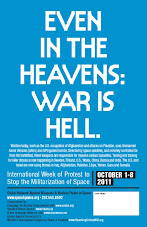
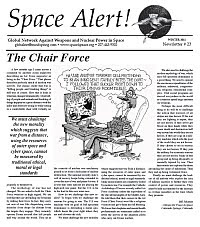

![[Solidarity from Japan for the Jeju] 253 individuals and 16 groups/organizations](http://2.bp.blogspot.com/_gnM5QlRx-4c/TR_YeNVE1yI/AAAAAAAAHWQ/ARyf6oQN0S0/S227/jeju_12_10j.jpg)
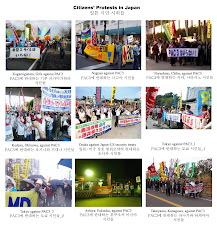
![[Translation] Korean organizations' statement: Immediately cancel the joint ROK-US drill Nov 26](http://2.bp.blogspot.com/_gnM5QlRx-4c/TPOE8VKXHFI/AAAAAAAAGlM/8lryt-8sFjc/S227/1.jpg)
![HOT! [Hankyoreh Hani TV] Beneath the Surface: the investigation into the sinking of the Cheonan](http://4.bp.blogspot.com/_gnM5QlRx-4c/TOI83qht8aI/AAAAAAAAGXU/22SW6Q5ntV8/S227/HaniTV%2BCheonan.gif)
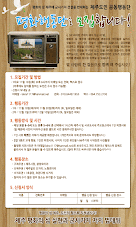
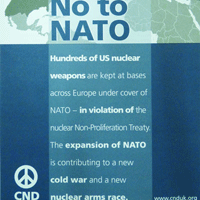

![[Translation]Statement against illegal inspection and unjust lay-off by the Kunsan USAFK!(Nov_2010)](http://4.bp.blogspot.com/_gnM5QlRx-4c/TOPLsVkZMqI/AAAAAAAAGZs/3YnnckIyAaY/S227/gunsan%2Bprotest.gif)
![[Translation] Korean organizations' statement against dispatching special force to the UAE on Nov.](http://4.bp.blogspot.com/_gnM5QlRx-4c/TOP95zHXlCI/AAAAAAAAGak/E0Ug1XtUFfM/S227/antiwarpeace.jpg)
![[Translation] Stop, Joining MD!: South Korean activists' statement and writing on Oct. 25, 2010](http://3.bp.blogspot.com/_gnM5QlRx-4c/TOP7Es4_2sI/AAAAAAAAGac/eWVMPD-U4p0/S227/StopMD.jpg)
![[In Update] People First, NO G-20 (Nov. 6 to 12, Korea)](http://2.bp.blogspot.com/_gnM5QlRx-4c/TJd53XBzHlI/AAAAAAAAFQo/ldO9JPE3eqo/S227/left21_G20.jpg)
![[International Petition] Stop US helipad plan in Okinawa to save great nature](http://4.bp.blogspot.com/_gnM5QlRx-4c/TKC2AHRNzBI/AAAAAAAAFUo/yGWXODTw_uM/S227/yanbaru_w.jpg)

![[Global Network] against the first launch of Quasi-Zenith Satellite, Japan, on Sept. 11, 2010](http://4.bp.blogspot.com/_gnM5QlRx-4c/TIowa1boy4I/AAAAAAAAFDI/82rAi98uq-c/S227/Qzss-45-0_09.jpg)

![[In update] Some collections on the Koreans’ protests against the sanction & war on Iran](http://4.bp.blogspot.com/_gnM5QlRx-4c/TJMvke6t8zI/AAAAAAAAFO4/tamQ8LUnOOA/S227/No+Sanction+on+Iran.jpg)
![[Three International Petitions] to End the Korean war and peace treaty(or peace resolution)](http://1.bp.blogspot.com/_gnM5QlRx-4c/THef7bzWxYI/AAAAAAAAE44/wwdzSDfYhdw/S227/border.jpg)
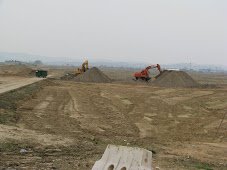


![[Collection of Documents] No Base Learning and Solidarity Program_Korea(June 14 to 20, 2010)](http://1.bp.blogspot.com/_gnM5QlRx-4c/TCTvVuN8NeI/AAAAAAAAEek/8vBJVaHdk10/S227/No-Base-banner.jpg)
![Site Fwd:[John Hines] A U.S. Debate coach’s research trip on the Issues of Korea](http://3.bp.blogspot.com/_gnM5QlRx-4c/TINCO36mzzI/AAAAAAAAE_w/Rds12NcBOXM/S227/Jeju-Peace-Tour.jpg)


![[News Update] Struggle Against the Jeju Naval Base since Jan. 18, 2010](http://1.bp.blogspot.com/_gnM5QlRx-4c/S1vvWaP25uI/AAAAAAAACkg/QvpW1tgOlKM/S226/scrum1.jpg)


![[Urgent] Please spread the Letter!: There was no Explosion! There was no Torpedo! (May 26, 2010)](http://4.bp.blogspot.com/_gnM5QlRx-4c/S_9JmsKEU7I/AAAAAAAAEP8/sAWjSPqxzUI/S227/grounded.jpg)
![Text Fwd: [Stephen Gowans]The sinking of the Cheonan: Another Gulf of Tonkin incident](http://1.bp.blogspot.com/_gnM5QlRx-4c/TAL_FtYKQ-I/AAAAAAAAERE/NEEMijiEcRM/S227/lee-myung-bak.jpg)
![[Japan Focus]Politics in Command: The "International" Investigation into the Sinking of the Cheonan](http://1.bp.blogspot.com/_gnM5QlRx-4c/TBMJ2syJzyI/AAAAAAAAEZU/uTYZccU5vyk/S227/wen_jiabao_and_lee_myungbak.png)
![[Japan Focus] Who Sank the SK Warship Cheonan? A New Stage in the US-Korean War and US-China](http://2.bp.blogspot.com/_gnM5QlRx-4c/S_iQ2vE5ZpI/AAAAAAAAEOU/Oo1SPcAe8FE/S227/buoy_map.gif)
![[Updated on 12/13/10] [Translation Project] Overseas Proofs on the Damages by the Military Bases](http://4.bp.blogspot.com/_gnM5QlRx-4c/S-qSj59gPLI/AAAAAAAAEGM/mwjlFtPE-jo/S227/missile.jpg)
![[International Petition] Close the Bases in Okinawa](http://3.bp.blogspot.com/_gnM5QlRx-4c/S8-z3DYNwNI/AAAAAAAADo4/OswTSchK09M/S227/2.jpg)

![[In Update]Blog Collection: No Korean Troops in Afghanistan](http://4.bp.blogspot.com/_gnM5QlRx-4c/SwnlLD9IewI/AAAAAAAAB9E/oUPssnpNidA/S226/No-Troops-to--Afghanistan.jpg)
